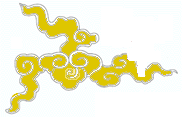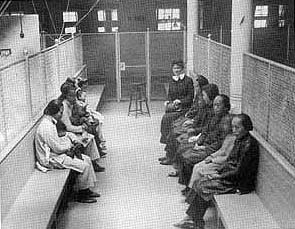
 |
|
Introduction
| Anti-Chinese
Laws |
Wong
Kim Ark's Case
| Legal
Issues Today |
Works Consulted
|
|
|
Anti-Chinese Laws Chinese
immigrants' quest for citizenship in the last half of the 19th century
was an uphill struggle against federal and state laws. Listed below are
relevant statutes and cases preceding US v. Wong Kim Ark that illustrate
this struggle. Though federal and state appellate courts at times overruled
local ordinances and state laws in order to advance Chinese rights, the
passage of the federal Chinese Exclusion Act in 1882 effectively shut
down the legal inroads to U.S. citizenship for Chinese people. However,
in US v. Wong Kim Ark, the US Supreme Court ruled that under the
fourteenth
amendment, persons of Chinese ancestry born in the US were
entitled to citizenship. |
|
California
Laws
|
|
|
1852 Cal. Stat. 78: California Immigrant Bonding Law. Shipmasters must furnish a $500 bond for all alien passengers landing in California. (Declared unconstitutional in People v. SS Constitution, 42 Cal. 578 (1872)). 1855 Cal. Stat. 194: Capitation Tax required a $50 tax on the master or owner of a vessel for the landing of each passenger who was not eligible for state or federal citizenship by law. (Act was struck down in People v. Downer 7 Cal. 169 (1857) and repealed in 1955). 1858
Cal. Stat. 295:
Chinese Exclusion Law prevented the further immigration of Chinese
or Mongolians to this State. (Declared unconstitutional in 1862 and repealed
in 1955). 1870 Cal Stat 330: "Mongolian" women emigrating to California must prove that they are of good character. 1891 Cal Stat 185: "The coming of Chinese persons into the State, whether subjects of the Chinese Empire or otherwise," is prohibited. (Declared unconstitutional in Ex Parte: Ah Cue, 101 Cal. 197 (1894)). |
|
San
Francisco Ordinances
(Not including actions of the Vigilance Committee of San Francisco or habitual mistreatment by the San Francisco police) |
|
|
1870:No Chinese may be employed by the government. 1870: Transporting goods on "yeo- ho" poles slung across the shoulders is prohibited. 1870- Gongs may not be rung at theatrical performances. No plays may be performed between midnight and daylight. 1873:
Laundry Ordinance: Laundries with animal- drawn carts must pay a $2 fee,
but laundries without carts must pay a $15 fee. (Invalidated by People
v Soon Kung).
1876: Queue Ordinance: Chinese prisoners must have their hair cut immediately after arriving at the county jail. (Declared unconstitutional in Ho Ah Kow v. Matthew Nunan 12 F. Cas. 252, (1879)). 1880-1883: Lotteries are forbidden. Building materials may not be imported from China. 1890: Bingham Ordinance: Chinese people, including citizens, must not live or work in San Francisco, except in "a portion set apart for the location of all the C bhinese." (Declared unconstitutional in In re: Lee Sing 43 F. 359 (1890)). 1900: All Chinese people must be placed under quarantine and inoculated for Bubonic Plague.(Declared unconstitutional in Wong Wai v Williamson 103 F. 1 (1900) and Jew Ho v Williamson, 103 F. 10 (1900)). |
Advertisements from The City Argus, San Francisco, February 20, 1886. |
|
San
Francisco, April 1, 1876 Sir:
We wish to call your attention to the fact that at the present time frequent
and unprovoked assaults are made upon our Chinese People while walking
peacefully the streets of this city. The assaulting party is seldom arrested
by your officers, but if a Chinaman resists the assault he is frequently
arrested and punished by fine or by imprisonment. Inflammatory and incendiary
addresses against the Chinese, delivered in the public streets to the
idle and and irresponsible element of this great city, have already produced
unprovoked and unpunished assaults on some of our people, and we fear
that if such things are permitted to go on unchecked a bloody riot against
the Chinese may be the result. Letter from the Chinese Six Companies to the San Francisco Chief of Police. |
|
|
|
|
 Angel Island Detention Center. Reproduced in Takaki, Ronald. Spacious Dreams: The First Wave of Asian Immigration. New York: Chelsea House, 1994.
|
1 Stat. 103 (1790): First federal naturalization statute restricted the right of naturalization to "any alien, being a free white person." 14th Amendment to the US Constitution (1868): provides that "all persons born or naturalized in the US, and subject to the jurisdiction thereof, are citizens of the US and of the State wherein they reside." 16 Stat. 739 (1869-71) Burlingame Treaty: Chinese citizens may emigrate freely to the United States "for purposes of curiosity, of trade, or as permanent residents." 1874: When all federal laws were codified, the language "being a free white person" was left out of the "naturalization" statute. Revised Statutes of 1875, sec 2169: The above omission is changed to read: "aliens being free white persons and to aliens of African nativity and to persons of African descent". This provision remained in the US statutes until the mid-20th Century. 1878: Federal Circuit Court in San Francisco rules that Chinese are ineligible for naturalization (Ah Yup, 1 F. Cas. 223 (C.C.D. Cal 1878)). 22 Stat. 58 (1882): Chinese Exclusion Act: Expressly forbids any court, state or federal, from granting citizenship to any Chinese person.In re Look Ting Sing, 21 F. 905 (C.C.D. 1884): Circuit court rules that Look Tin Sing, born in Mendocino, CA, who left for China at age nine to be educated and was denied reentry to the US upon his return at age 13, was an American citizen and had a right to enter the country. For some reason, the decision was not appealed to the US Supreme Court. In re Wong Kim Ark, 71 F. 382 (N.D. Cal 1896): Wong Kim Ark, born in San Francisco, CA, returned there after a visit to China and was prevented from landing and detained aboard ship by the Collector of Customs. Citing Ark's birth in the US and relying on the authority of Look Tin Sing, the court ordered him discharged from custody. The decision was immediately appealed to the US Supreme Court. |
All
Persons Born...
combines
web based and physical exhibits. It was produced by the
UC
Hastings College of the Law Library,
4th Floor, 200 McAllister Street, San Francisco.
Research and text by Chuck Marcus, Reference Librarian. Updates by Alysa Gerard. Research and web design by Beret Aune and Katie Wadell, Library Assistants.